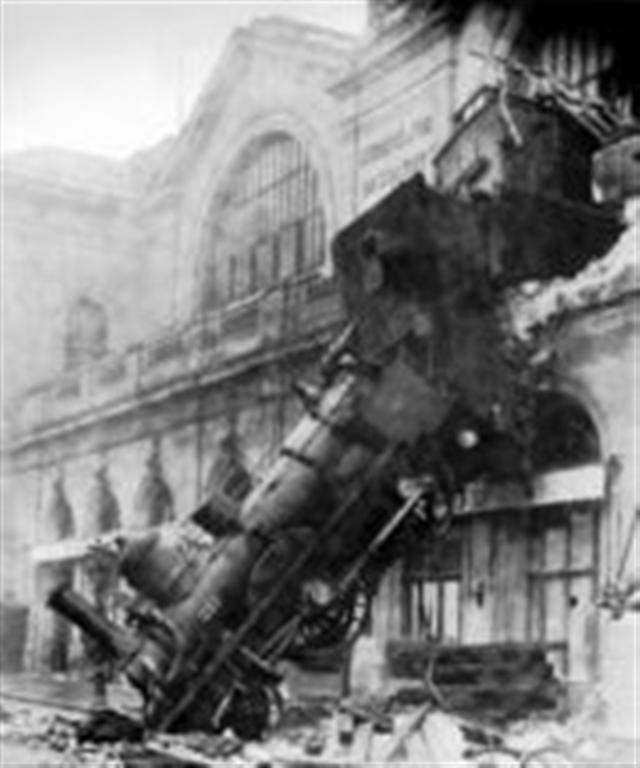Are accidents ever accidental?
A few years ago, while staying in London, I was coming down the stairs carrying an open suitcase, but there were more steps than there were at home, I couldn’t see where I was putting my feet and I was preoccupied with anxieties about being away from home. Three steps above the bottom of the staircase, I stepped out – into nothing – and landed heavily on my left leg, rupturing my quadriceps tendon and rendering me disabled for three months.
It was an unfortunate accident, but how accidental was it? On reflection, I realised there was a trail of causation.
Accidents are often caused by mistakes, lapses in concentration or errors in perception resulting in behaviour that is clumsy or inappropriate. Our expectations of what might happen are not only determined by what we really see or hear, but by habit – what usually happens. Most of what happens in our lives is familiar, we go through it on auto-pilot. We see what we expect to see, hear what we expect to hear, as long as things proceed on cue, we don’t think about what we’re doing; we just do it.
Our thoughts and actions are so conditioned by experience that for the most part, we don’t have to pay much attention. Training and experience have set up circuits that cause us to react automatically to a whole variety of familiar circumstances. To take a current example, Roger Federer is a tennis playing automaton for much of his game. Hard wired into his brain is an extensive repertoire of responses to every possible nuance of court conditions, ball trajectory, his opponents method of play, the state of the game, the weather; he reacts without thinking and can produce the perfect cross court volley in the right situation. He functions in the moment; things only go wrong if he regrets the last shot and worries about the next. But for most of us, life is not a tennis match, everyday life always throws up the unexpected and unless we are alert and paying attention and able to adapt our responses, we can all too easily assume the expected and cause an ‘accident’.
Our focus is more likely to be distracted if we are tired, upset and preoccupied about something else. If our mind is not on the job, we ignore the cues, we expect something to be there but it isn’t. So if we are in charge of a dangerous machine, operating equipment at work or driving a car, or even just walking down the stairs, we are more likely to make a mistake and have an accident. My mind was so distracted by domestic worries, I was not focussed on being ‘in London’ and so my legs behaved as if I was coming down the stairs at home.
Accidents do not always occur because of lapses or distractions. Emotion can play its part. Desire is not only a potent cause of distraction but can make us take the most enormous risks. Fury has to be satisfied no matter the consequences. Guilt or shame can induce a wish for punishment or even injury and death, that is often expressed in the most foolhardy and dangerous behaviour.
Just as we all possess an instinct for self preservation, so there is a much darker side, an urge to self destruction. Among the various manifestations of this death wish are overindulgence in alcohol or drug abuse. Many people use drugs or alcohol to achieve a state of oblivion, so releasing them from the normal inhibitions and calculations over risk. I used to belong to the Night Climbers of Cambridge. After a heavy night in the pub, my friends and I would go out and, completely unprotected by ropes or pegs, climb up the walls of the colleges, clamber over roofs and leap from one building to another. What was that about; a confirmation of the immortality of youth, an urge for self destruction, or a desperate attempt to attract a pretty girl?
Accidents often have a trajectory, a trail of consequences, stemming from a single decision made for the wrong reasons and leading in some cases to injury or death. So when a woman accepts the invitation of her boss to dinner, drinks too much, has sex with him and then has to drive fifty miles back home in the middle of the night, all the components, tiredness, preoccupation, fear, guilt, self disgust and being in charge of a lethal machine, are assembled for a major accident.
Accidents also have a purpose. If you are injured, then you don’t need to do something you don’t want to, to take an exam, have an awkward meeting, take a difficult decision or own up. The accident does the job for you, extricates you from an impossible situation, and at the same time, recruits the love and care your spouse, family and friends.
For me, my accident allowed me time out from external distractions while providing the time and space to relax, rest, feel the confidence of being cared for at home and finish my book. In time my tendon mended and so, for a while, did the connections with my family.



